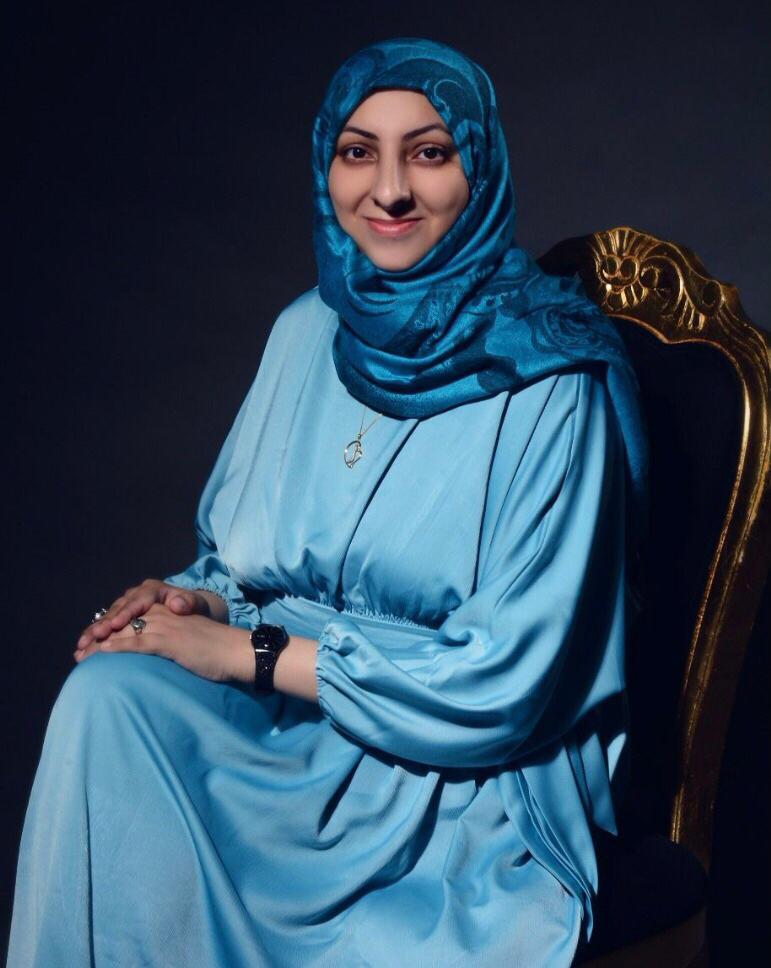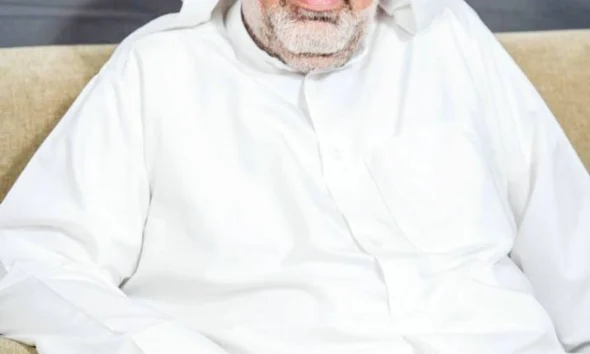Home » Interviews » Saudi Novelist Zainab Al-Bahrani told “Arabisk London”: The Sensation of Spiritual Liberation that Words Provide Transcends the Alphabet
Inspirational Figures
Saudi Novelist Zainab Al-Bahrani told “Arabisk London”: The Sensation of Spiritual Liberation that Words Provide Transcends the Alphabet
Published
1 year agoon
By
Huda
Zainab Al-Bahrani has been a bookworm since she was a child. She found a vast and limitless cosmos and longed to be a part of it, to put down what was going through her mind and help weave its complexities.
She started by sending some of her works to Arab periodicals and newspapers. After that, she printed her first books, and she hasn’t stopped being an amazing writer ever since.
Zainab Al-Bahrani is a writer who has captivated readers’ hearts with her romance novels. She challenged their intellects with her critical writings and inspired them with her short tales.
Saudi author Zainab Al-Bahrani discusses her literary career with Arabisk London in this interview. She discusses her experiences and obstacles, her thoughts on writing and publishing, and her interest in women’s issues. Along with the influence of great writers on her, and her advice for young people wishing to pursue writing careers.
Interviewed by: Baida Qatlish
-
How did Zainab Al-Bahrani get started in the writing world?
I have been immersing myself in the ocean of reading since I was a little child. A place where mental pleasure has no boundaries. Anybody whose spirit is addicted to this magical, surprising world can only hope to be a part of it. The only way to be a part of it is to take part in the intricate nuances woven into literature. He/she spreads the thoughts that are going through their head to other brains.
Before it became a cherished pastime, sending some of my writing to Arab newspapers and magazines was a delightful experience. The sensation of spiritual liberation brought about by words reaching other people’s thoughts and emotions went beyond the alphabet’s expressive possibilities.
Then, I tried to publish my initial works in the hopes that there would be hundreds of readers around the Arab world and the diaspora get my message, which carries my name, ideas, and feelings. I continue to sail the seas of words with joy to this day.
-
You have written tales and essays, and you have also created some poetic texts. However, writing novels has elevated to the top of your literary career, leading to your classification as a “romantic novelist.” What, in your opinion, is the cause?
Perhaps because of my novel, “Will You Allow Me to Love You?” Published in 2013. It was the most popular with readers and the most widely circulated and sold of all my works.
We live in a time when individuals appear to be against romance and declare that it is an illusion. Although they nevertheless want psychological fulfillment in this respect.
Since this satisfaction is unattainable in real life, people turn to music, movies, TV shows, and novels. They subtly satisfy their needs without disclosing that they are fallible human beings who, despite their circumstances or age, naturally experience sadness, nostalgia, longing, and the need for someone to love them.
-
Did Zainab Al-Bahrani encounter any difficulties when you initially started writing?
The field is undoubtedly challenging, and writing words down in notebooks is not enough to succeed in it. Moreover, my conservative family and the society I live in do not support women pursuing careers in mass communication, which could lead to celebrity.
-
Do you still have obstacles to overcome as a writer?
Greatly! The primary obstacles are not with writing itself; rather, they are with the subsequent communication of written concepts, which is a matter of equal importance to writing since publishing is the medium through which the written word is transmitted from the sender “the writer” to the recipient “the reader”, and without publishing, writing is meaningless as an endeavour at personal blogging to heal or release the soul from some of its pains, yet this is not my main goal.
The most well-known obstacle is probably the “restrictions of expression.” They are made more difficult by the public opinion dominance of the less aware segments of society on social media. These individuals have the power to ruin a writer’s entire life on a variety of familial, societal, professional, and psychological levels by inciting a ferocious attack against a simple idea expressed in good faith. As a result, they purposefully burden the idea beyond what it necessitated.
The view was once reserved for literary types or those with a certain knowledge and cultural background who could consent to publish their ideas in periodicals and newspapers.
Nowadays, everyone has come to disparage the inventor or a well-known figure in any industry just because he/she has heard that the information this creator has provided does not align with the prevailing viewpoint of a certain segment of society!
Getting the financial rights that a published work deserves, in whatever form, from the majority of its benefactors is another readily apparent obstacle. People from near and far frequently ask for writing services without considering the potential cash gain!
In my work journey, I came across businesses whose main line of work is “content writing,” and they want us to work for them in exchange for free benefits!
Inexperienced filmmakers ask for screenplays for short films and pilot episodes of television shows under strict guidelines, with requests for additions, alterations, and rewrites accepted without charge! The creators of online magazines want their writers to put in a lot of work as co-editors for nothing!
Regarding the issue of publishing houses that disperse authors’ books without charging them, this is a common complaint even when you are certain that the sales rate is not zero!
Aside from having to work in a profession that has nothing to do with creativity for years to make ends meet. This issue is the primary cause of a literary creator’s inability to dedicate himself to writing. As a result, he exhausts himself throughout the day, using time, energy, and emotions that are not commensurate with his degree of creativity or his standing as a writer.
Unlike certain nations in Europe and East Asia, we have a problem with the dearth of agencies that are specialised in handling the work of brilliant artists, notably writers, and novelists. Agencies that correctly promote the name of this creative individual, identify the greatest prospects with high financial returns for him, and protect him against unfair attack campaigns.
A writer like this will be helpless and left to fend for themselves without a project like this.
-
Based on your years of expertise writing literary fiction, what draws Arab readers to read and be inspired by written material the most?
Honesty! First, foremost, second, third, and tenth, is honesty; following is linguistic elegance. The energy of honesty concealed between letters is the quickest way to the reader’s heart than the writer’s. People, these days are forced to live in a world full of hypocrisy and lies. The language that is characterised by a degree of elegance is necessary to satisfy their feelings with the pleasure of its music. They find themselves longing to receive more of that magic.
-
Which subjects or problems does Zainab Al-Bahrani like to write about? How do you select subjects?
Frequently, a concept piques the author’s interest, akin to receiving inspiration from the nonphysical realm. Some of these thoughts catch my heart and intellect, inspiring me to compose them. Put another way, it’s them, not me, who chooses me. I have found that this approach works, therefore I depend a lot on my feelings and instincts. Unmatched achievement in crafting texts that have the power to influence the reader.
-
You only have one children’s story, “Mounir the Millionaire.” Do you intend to publish any more pieces that fall within this literary genre?
Sure, I’m working on a new children’s storybook. I’m hoping my God will help me have it published when it’s ready. However overall, I like to write more for adults than children.
As soon as a person in our Arab area reaches the age of adulthood, interest in his feelings, hopes, and desires fades, as if he has transformed into something of no importance, although he is the principal driver of sociological, economic, and other events in reality.
This individual occasionally needs care comparable to that of children in a variety of professions. To help him uncover his actual nature and get over his complexes and inner suffering.
-
Recently, it has been seen that your writing style has shifted to covering news on dramatic and cinematic artwork as well as famous artists. What drew you to this area of study?
Two facets of the same coin—”the art of conveying the story”—are the dramatic and narrative literary works. The world of television, however via different methods, has a certain allure and a delightful lustre that entices the lover of the moving image to read about it.
Zainab Al-Bahrani is a lover of that magical world. I enjoy learning more about it through reading, researching, and exploring. I am happy to be a part of it. It is a gateway to learning a lot about the hidden sides of our Arab societies’ realities and unknown aspects of history.
-
Which well-known celebrities’ lives and careers have you covered in your articles?
Many celebrities, such as Dr. Parwin Habib from cultural media, Syrian star Yasser Al-Azma, comedy star Abdul Salam Al-Nabulsi, Hassan Muhammad, a rising star in Bahrain, Muhammad Ashoub make-up artist for celebrities and Politics, Dr. Riyad Naasan Agha, a creative screenwriter, and former Minister of Culture, are just a few names.
-
Many of your writings concentrate on topics about women. Is this curiosity connected to what you previously mentioned—your experience with environmental constraints that can prevent women from achieving certain of their goals?
To fully empathise with a problem, a person usually has to know some of the underlying sufferings. To be able to sympathise with others who are still fighting for a better way of life.
As women, we are lucky to have access to education for the most part. That has allowed us to discuss and find solutions to common problems. This will eventually result in a world that values and respects women’s ambition and right to life without unjustified limitations.
-
Have any writers or authors impacted your career in literature?
Numerous, but not exclusive examples include the poet Nizar Qabbani. The writers Ghada Al-Samman and Ghazi Al-Gosaibi, and the writers Emily Nothomb and Patrick Suskind, are not Arab.
-
How does Zainab Al-Bahrani respond to criticism and divergent viewpoints on your work?
In our Arab society, I treat it as a “healthy phenomenon.” This kind of viewpoint indicates that society reads my work on the one hand. It has stimulated its minds to form an opinion – whether negative or positive – on the other hand. This type of serious, unrestricted mental mobility is desperately necessary to progressively raise public taste.
-
Does Zainab Al-Bahrani have any words of wisdom for young persons wishing to pursue careers in writing?
Try your hardest to find your authentic self and use every channel to communicate it. Always be refining your artistic instruments. Make every effort to establish positive contacts with the powerful local cultural community. No matter how far the initial stages of achievement may appear, never give up.
-
One last thing?
I am thankful to “Arabisk London” for its astute decision to select diligent and remarkable human role models to feature through interviews. It enables a greater number of readers to become aware of them and their contributions.
Furthermore, it is the discerning media that unearths pearls from the ocean’s depths. It does not settle with re-imagining diamonds that people have already seen previously on several occasions behind the exhibit windows of large retailers. I anticipate that you will have a bright future as you continue to spread your media message.
Read more about Arabisk London interviews Zainab Salbi, a humanitarian activist who believes that love and hope have more power than fear and violence

Nammos Resort AMAALA: KSA’s New Address for International Luxury Hospitality

Muhammad Mahfouz: Trump will Respond to Riyadh’s Ambitions, and We Must Develop a Gulf-Arab Project with Iran

The World Stadiums & Arenas Summit 2025 has Arabisk London – Saudi Arabia as a Media Partner

Laheq: The First Private Saudi Island to Obtain Light at Last

The “New Square” Alters the Modern Life’s Notion in Riyadh







